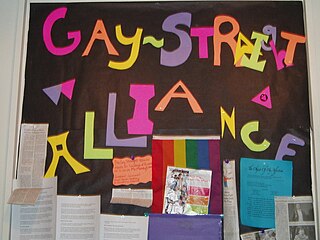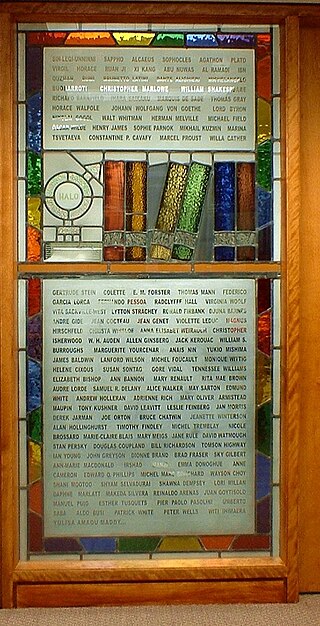
Rainbow Youth (stylised RainbowYOUTH, formerly Auckland Lesbian and Gay Youth) is a registered charitable organisation [1] that provides education, information, support and advocacy for LGBTIQ youth in New Zealand. [2] It was formed in 1989.

Rainbow Youth (stylised RainbowYOUTH, formerly Auckland Lesbian and Gay Youth) is a registered charitable organisation [1] that provides education, information, support and advocacy for LGBTIQ youth in New Zealand. [2] It was formed in 1989.
Rainbow Youth was originally formed under the name Auckland Lesbian and Gay Youth in 1989 and became an incorporated society in 1995, also being renamed Rainbow Youth at the same time. [3] Between the late 1990s and 2005, RainbowYOUTH began their education program in Auckland high schools, as well as several of their peer support groups. [3] [4]
Rainbow Youth's mission is “to provide unbiased information and education regarding sexuality, gender and identity to everyone in the community, in order to foster understanding and acceptance of diversity” [5] and "to provide support, information and advocacy services to queer and questioning youth, their friends, and whānau". [5]
Rainbow Youth is run by youth and for youth, [6] with its executive board being made up entirely of people under the age of 27. [7]
Rainbow Youth runs up to seven peer-support groups in Auckland, Tauranga and Whangārei. [8] Rainbow Youth's education programme is delivered throughout the year to participating high schools throughout the Auckland region. [9] The workshops have been reported to be highly successful, with a study showing that between 91% and 94% of students would recommend the workshops to other young people. [9] Rainbow Youth is also behind a rural outreach project called the I'm Local Project, which aims to provide free sexual and gender identity affirming resources and information to rural schools, medical centres and community organisations. [10] Rainbow Youth provides in-person support peer support in Auckland, Bay of Plenty, Wellington, and Taranaki. [11]
Gay bashing is an attack, abuse, or assault committed against a person who is perceived by the aggressor to be gay, lesbian, bisexual, transgender or queer (LGBTQ+). It includes both violence against LGBT people and LGBT bullying. The term covers violence against and bullying of people who are LGBT, as well as non-LGBT people whom the attacker perceives to be LGBT.

A gay–straight alliance, gender–sexuality alliance (GSA) or queer–straight alliance (QSA) is a student-led or community-based organization, found in middle schools, high schools, colleges, and universities. These are primarily in the United States and Canada. Gay–straight alliance is intended to provide a safe and supportive environment for lesbian, gay, bisexual, transgender, and all LGBTQ+ individuals, children, teenagers, and youth as well as their cisgender heterosexual allies. The first GSAs were established in the 1980s. Scientific studies show that GSAs have positive academic, health, and social impacts on schoolchildren of a minority sexual orientation and/or gender identity. Numerous judicial decisions in United States federal and state court jurisdictions have upheld the establishment of GSAs in schools, and the right to use that name for them.
A straight ally, heterosexual ally, or cis ally is a heterosexual and cisgender person who supports equal civil rights, gender equality, and LGBTQ+ social movements. Individuals may meet this designation through their actions without actively identifying as an ally.

LGBTI Rights in Finland Seta, founded in 1974, is the main LGBT rights organisation in Finland. It is a national organization with several member organizations around the country. Seta´s secretary general is Kerttu Tarjamo and chairperson Pekka Rantala. The 11th President of Finland, Tarja Halonen, was the chairwoman of Seta 1980–1981.

New Zealand society is generally accepting of lesbian, gay, bisexual, transgender and queer (LGBTQ) peoples. The LGBTQ-friendly environment is epitomised by the fact that there are several members of Parliament who belong to the LGBTQ community, LGBTQ rights are protected by the Human Rights Act, and same-sex couples are able to marry as of 2013. Sex between men was decriminalised in 1986. New Zealand has an active LGBTQ community, with well-attended annual gay pride festivals in most cities.

The questioning of one's sexual orientation, sexual identity, gender, or all three is a process of exploration by people who may be unsure, still exploring, or concerned about applying a social label to themselves for various reasons. The letter "Q" is sometimes added to the end of the acronym LGBT ; the "Q" can refer to either queer or questioning.
The Spectrum Center is an office at the University of Michigan in Ann Arbor that is dedicated to providing education, outreach, and advocacy for the lesbian, gay, bisexual, transgender, queer, and allied (LGBTQA) community. Since the organizations' creation in 1971, the Spectrum Center's mission statement has been to "enrich the campus experience and develop students as individuals and as members of the LGBTQA community." The organization achieves this through student-centered education, outreach, advocacy and support.

Kind Space is an LGBT community centre located in Ottawa, Ontario, Canada. They are the oldest registered LGBT-specific charity in Canada, becoming registered in 1984. The organization serves gay, lesbian, bisexual, transgender, Two-Spirit, non-binary, queer, questioning, intersex, asexual, QTBIPoC, of all ages within the National Capital Region. They provide a number of services including support groups, education, research, advocacy and community space.

Historically speaking, lesbian, gay, bisexual, and transgender (LGBTQ) people have not been given equal treatment and rights by both governmental actions and society's general opinion. Much of the intolerance for LGBT individuals come from lack of education around the LGBT community, and contributes to the stigma that results in same-sex marriage being legal in few countries (31) and persistence of discrimination, such as in the workplace.

Sexual orientation and gender identity in the Australian military are not considered disqualifying matters in the 21st century, with the Australian Defence Force (ADF) allowing LGBT people to serve openly and access the same entitlements as other personnel. The ban on gay and lesbian personnel was lifted by the Keating government in 1992, with a 2000 study finding no discernible negative impacts on troop morale. In 2009, the First Rudd government introduced equal entitlements to military retirement pensions and superannuation for the domestic partners of LGBTI personnel. Since 2010, transgender personnel may serve openly and may undergo gender transition with ADF support while continuing their military service. LGBTI personnel are also supported by the charity DEFGLIS, the Defence Force Lesbian Gay Bisexual Transgender and Intersex Information Service.
Allsorts Youth Project is an LGBT youth charity in East Sussex. Founded in 1999 by Jess Wood and James Newton, the project aims to meet the needs of lesbian, gay, bisexual, trans* and unsure youth in Brighton and Hove and the wider East Sussex area.

In the post-Stonewall era, the role of libraries in providing information and services to LGBTQ individuals has been a topic of discussion among library professionals. Libraries can often play an important role for LGBTQ individuals looking to find information about coming out, health, and family topics, as well as leisure reading. In the past 50 years, advocate organizations for LGBTQ content in libraries have emerged, and numerous theorists have discussed various aspects of LGBTQ library service including privacy concerns, programming, collection development considerations and librarian/staff education needs, as well as special services for juvenile and teen patrons.
Intersex Aotearoa is a nonprofit organisation based in New Zealand, and is a national advocacy and peer support organisation for intersex people. The organisation was founded in 1996 by Mani Mitchell, and has previously been known as the Intersex Trust Aotearoa New Zealand and Intersex Awareness New Zealand.
galck+, formerly The Gay and Lesbian Coalition of Kenya (GALCK), is the national Sexual Orientation Gender Identity and Expression (SOGIE) umbrella body, representing LGBTQ+ voices across Kenya.
Chennai has LGBTQIA cultures that are diverse concerning- socio-economic class, gender, and degree of visibility and politicisation. They have historically existed in the margins and surfaced primarily in contexts such as transgender activism and HIV prevention initiatives for men having sex with men (MSM) and trans women (TG).

LGBT Foundation is a national charity based in Manchester with a wide portfolio of services. With a history dating back to 1975, it campaigns for a fair and equal society where all lesbian, gay, bisexual and trans (LGBTQ) people are able to reach their full potential. They support over 40,000 people directly every year, and a further 600,000 online. They provide direct services and resources to more LGBT people than any other charity of its kind in the UK.
LGBTQ psychology is a field of psychology of surrounding the lives of LGBTQ+ individuals, in the particular the diverse range of psychological perspectives and experiences of these individuals. It covers different aspects such as identity development including the coming out process, parenting and family practices and support for LGBTQ+ individuals, as well as issues of prejudice and discrimination involving the LGBTQ community.